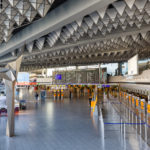Singapore Airlines (SIA) and low-cost subsidiary Scoot are to become the first airlines in Singapore to receive sustainable aviation fuel (SAF) produced at Neste’s refinery in Singapore, following a purchase of over 1,000 neat tons.
The milestone delivery will also mark the first direct supply of Neste’s SAF to airlines at Changi Airport, using the fuel producer’s end-to-end supply chain capabilities. “The supply of locally produced SAF to Changi Airport is a milestone in our journey of supporting the aviation industry and governments in the region to achieve their emissions reduction goals,” explained Alexander Kueper, vice president of renewable aviation at Neste.
Chief sustainability officer of Singapore Airlines Lee Wen Fen added that the agreement with Neste symbolised an “important milestone in the SIA Group’s journey to have a minimum of 5% sustainable aviation fuel in [its] total fuel uplift by 2030,” in line with the Singaporean government’s upcoming mandate. In February 2024, it was announced that flights departing Singapore must use a minimum 1% blended SAF from 2026, rising to 3%-5% by 2030. A SAF levy set at “a fixed quantum and projected SAF price” would “provide an important demand signal to fuel producers and give them the incentive to invest in new SAF production facilities,” added Singapore Transport Minister Chee Hong Tat.
Neste’s refinery expansion project (which commenced in 2023) will facilitate the production of up to one million tons a year, making it the world’s largest producer of SAF in terms of capacity. Although other manufacturers may consider using palm oil as feedstock, Neste only utilises used cooking oil and animal fat waste, confirmed the company, with the exact volumes of these raw materials used varying over time “depending on availability, price, customer demand, and market requirements (eg regulation)”.
This order of blended fuel will be supplied to Changi Airport’s fuel hydrant system in two batches, in Q2 and Q4 of this year.
Starting from this month, SIA will also offer 1,000 SAF book and claim units (BCUs) for purchase, each representing one tonne of neat SAF with its associated carbon dioxide reduction benefits. “Purchasing SAF BCUs allows corporate travellers, shippers and freight forwarders to claim the associated environmental benefits for flights related to their business travel and operations, validating the demand for SAF BCUs and supporting the development of the nascent SAF industry,” explains SIA.
Subscribe to the FINN weekly newsletter

